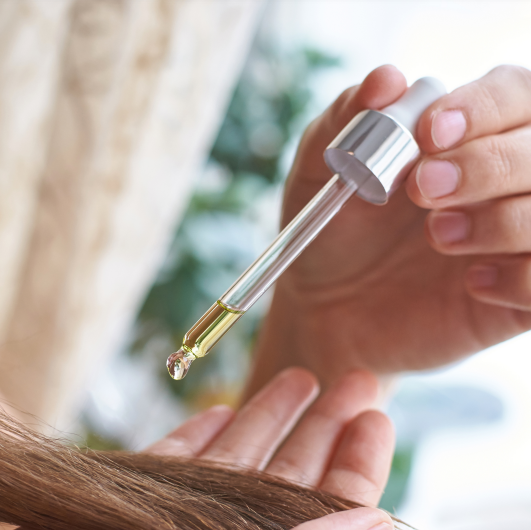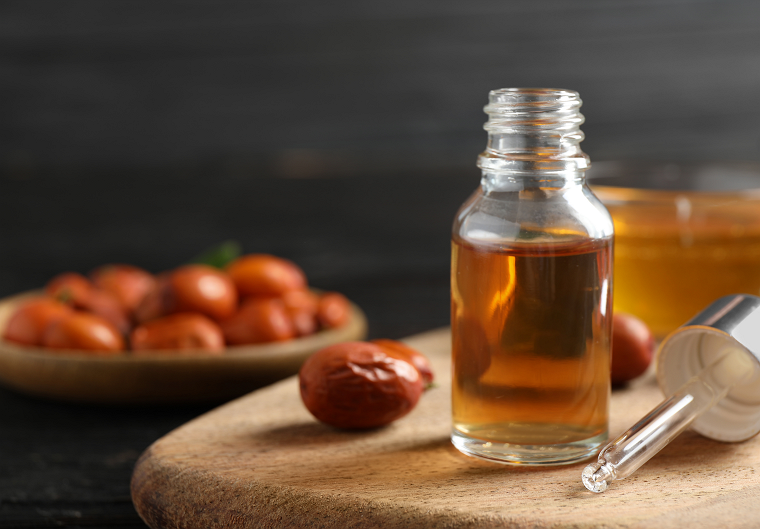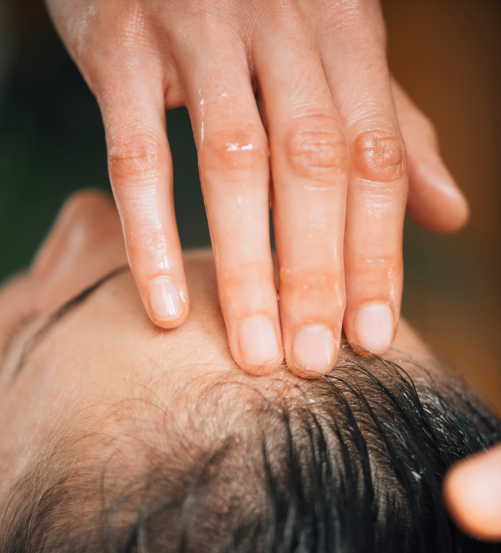If you’ve been on the hunt for a natural remedy for your hair woes, then you might have come across the term “jojoba oil.” I sure did! Jojoba oil for hair has become increasingly popular, and it’s no surprise why.
This incredible natural oil, derived from the seeds of the jojoba plant, has transformative properties that can breathe new life into dull, lifeless hair.
As someone who has always struggled with hair that tends to be dry and brittle, I decided to embark on a jojoba oil journey, and what I discovered was nothing short of amazing.
In this article, I’m excited to share my experience with using jojoba oil for hair and explore the numerous benefits it can offer for all hair types.
Let me take you on a journey through the transformative world of jojoba oil and show you how it can become an indispensable part of your hair care routine.
What Is Jojoba Oil?
Jojoba oil is a golden, clear liquid extracted from the seeds of the jojoba plant (Simmondsia chinensis), native to the southwestern United States and parts of Mexico. Though often referred to as an “oil,” it’s technically a liquid wax ester.
This unique composition makes jojoba oil strikingly similar to human skin sebum, our body’s natural oil. It’s hypoallergenic, packed with essential vitamins such as E and B, as well as minerals like copper, zinc, selenium, and chromium.
Jojoba oil doesn’t clog pores, making it an ideal moisturizer for both skin and hair. In hair care, jojoba oil moisturizes the scalp and hair, combats dandruff, and promotes hair health.
Its anti-inflammatory and antioxidant properties also make it a popular choice in skincare routines. Being non-comedogenic, it hydrates without triggering breakouts, balances oil production, and supports the skin’s natural barrier.
Benefits of Using Jojoba Oil for Hair

- Moisturizes the Scalp and Hair: Jojoba oil is a superb moisturizer. Its structure closely resembles our scalp’s natural sebum. When applied, it hydrates the scalp and hair strands, preventing dryness and reducing the chances of dandruff. This leaves your hair feeling soft and manageable.
- Strengthens Hair Follicles: The vitamins and minerals in jojoba oil, such as vitamin E, B vitamins, and zinc, help fortify hair follicles. This can lead to healthier hair growth and a reduction in hair breakage.
- Adds Shine and Luster: Want that natural shine back? Jojoba oil smoothens hair cuticles and replenishes lost moisture, giving your hair a beautiful, natural sheen without making it feel greasy.
- Balances Scalp Oil Production: Being similar to our scalp’s natural oil, jojoba can balance oil production. It hydrates a dry scalp and can also regulate excess oiliness, ensuring that your scalp maintains an optimal oil level.
- Reduces Hair Breakage: Jojoba oil’s moisturizing properties strengthen the hair shaft. This reduces the susceptibility of hair strands to breakage and split ends, allowing your hair to grow longer and remain healthy.
- Antifungal and Antibacterial Properties: Jojoba oil naturally fights against common scalp issues like dandruff or folliculitis, thanks to its antifungal and antibacterial traits. This means a cleaner, healthier scalp with regular use.
- Protects Against Heat Damage: Applying jojoba oil before using heat styling tools can offer a protective layer, reducing the potential harm from direct heat. While it’s not a complete guard, it does provide an added layer of protection.
Click here to buy Jojoba oil organic.
How To Use Jojoba Oil For Hair
Direct Scalp Application:
-
- Step 1: Warm a small amount of jojoba oil by rubbing it between your palms.
- Step 2: Massage the oil gently into your scalp using your fingertips. This promotes circulation and helps in absorption.
- Step 3: Leave it on for 30 minutes or overnight, then shampoo as usual.
Hair Mask:
-
- Step 1: Mix jojoba oil with other beneficial ingredients like coconut oil, honey, or aloe vera gel.
- Step 2: Apply the mixture thoroughly from roots to tips.
- Step 3: Leave it on for at least 30 minutes, then wash off with shampoo.
As a Hair Serum:
-
- Step 1: Take a few drops of jojoba oil in your palms.
- Step 2: Smooth it over your hair, focusing on the ends. This helps in taming frizz, adding shine, and providing a protective layer against environmental damage.
Conditioner Boost:
-
- Step 1: Add a few drops of jojoba oil to your regular conditioner.
- Step 2: Use the conditioner as you usually would. The oil enhances the moisturizing effects of your conditioner.
Pre-Shampoo Treatment:
-
- Step 1: Apply jojoba oil to your hair and scalp before you shampoo.
- Step 2: Leave it on for 15-30 minutes.
- Step 3: Shampoo as usual. This method helps to ensure that your hair doesn’t get stripped of its natural oils during the washing process.
Heat Protector:
-
- Step 1: Before using heat tools like straighteners or curling irons, apply a few drops of jojoba oil to your hair.
- Step 2: Style as desired. The oil forms a protective barrier, minimizing potential heat damage.
Remember, everyone’s hair is different. It’s essential to experiment and see which method works best for your hair type and needs. Start with a small amount of oil; you can always add more if needed. Too much can make your hair look greasy.
Related: Jojoba Oil Hair Mask: Benefits And How To Use It

Side Effects Of Jojoba Oil
Jojoba oil is generally considered safe for most people when used topically, especially since its structure closely resembles human sebum. However, as with any natural product, some individuals might experience side effects. Here are some potential side effects of using jojoba oil:
- Allergic Reactions: Though rare, some people might be allergic to jojoba oil. Signs of an allergic reaction include redness, itching, swelling, or a rash. It’s always a good idea to do a patch test on a small area of your skin before applying it extensively.
- Acne Breakouts: While jojoba oil is non-comedogenic (doesn’t clog pores) and can often help in balancing oil production, there’s still a possibility that some people might break out, especially if they are prone to acne.
- Over-Moisturization: Overuse can lead to excessively oily hair or scalp, which might not be ideal for those with already oily hair types.
- Interaction with other Ingredients: It’s always essential to be aware of what you’re mixing. Jojoba oil might not mix well with certain chemicals or active ingredients in other products, potentially neutralizing benefits or leading to unwanted reactions.
- Purging Phase: Sometimes, when one starts using jojoba oil, they might experience a brief period where their skin appears to break out more than usual. This could be due to the oil drawing out impurities, leading to a temporary increase in breakouts. This doesn’t happen to everyone, and the phase usually passes quickly.
As a general rule, it’s crucial to source high-quality, pure jojoba oil from reputable sellers. Impurities or additives in lower-quality oils can also cause adverse reactions. If you’re uncertain or have a history of allergies, always consult with a dermatologist or healthcare provider before incorporating new products into your routine.
Frequently Asked Questions
What is jojoba oil derived from?
Jojoba oil is extracted from the seeds of the jojoba plant (Simmondsia chinensis), which is native to the southwestern United States and northern parts of Mexico.
Can I ingest jojoba oil?
No, jojoba oil is not meant for internal consumption. It’s primarily used for topical application on skin and hair.
Is jojoba oil good for all hair types?
Yes, jojoba oil is versatile and can benefit all hair types, from dry to oily. However, the amount used might vary depending on the hair type.
Can I use jojoba oil on my face?
Absolutely! Jojoba oil is non-comedogenic, which means it won’t clog pores, making it an excellent moisturizer for the face.
How often should I use jojoba oil on my hair?
This can vary based on individual needs, but many people find benefit in using it 1-3 times a week. It’s essential to see how your hair responds and adjust accordingly.
Can I mix jojoba oil with other oils or ingredients?
Yes, jojoba oil blends well with other oils like coconut oil, almond oil, and essential oils, enhancing the benefits when used together.
How should I store jojoba oil?
Store jojoba oil in a cool, dry place away from direct sunlight. Properly stored, it has a long shelf life and remains stable for extended periods.
Does jojoba oil have a scent?
Pure jojoba oil has a mild, nutty scent. However, its aroma is generally so subtle that it’s barely noticeable.
Will jojoba oil stain my clothes or sheets?
While any oil can potentially leave a mark on fabrics, jojoba oil is relatively light. If you apply it and let it absorb for a few minutes before dressing or laying down, it’s less likely to stain.
Is jojoba oil safe for pets?
While jojoba oil is generally safe for topical use on pets, it’s always best to consult with a veterinarian before applying anything new to your animal’s skin.
Conclusion
Jojoba oil, with its unique properties mirroring human sebum, has emerged as a natural wonder for holistic beauty care. Particularly when considering jojoba oil for hair, its benefits range from moisturizing dry strands to balancing scalp oil production. Though its applications are vast, it’s crucial to use it judiciously to reap its full benefits. For those keen on enhancing their hair care regimen, jojoba oil offers a potent and natural solution worth integrating.
Discover more wonderful ways to use jojoba oil for intimacy, eyes, scars, nails, hair, feet and skin including wrinkles. You can also find more jojoba oil guides here.



Comments are closed.